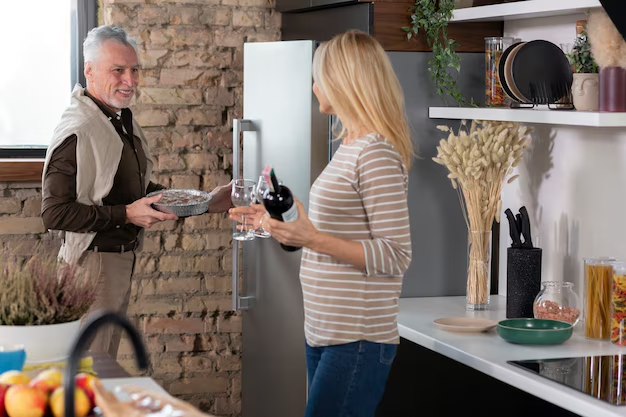How to Responsibly Recycle Your Old Refrigerator: A Complete Guide
Staring at an outdated refrigerator that's taking up space in your garage or basement? You might be tempted to simply leave it on the curb for garbage collection, but that’s neither environmentally responsible nor safe. Refrigerators contain materials that can be hazardous if they aren't disposed of properly. This guide will walk you through the most effective and eco-friendly ways to recycle an old refrigerator and provide key insights into why it's so crucial to handle this appliance with care.
🌟 Why Recycling Refrigerators Matters
Understanding the Environmental Impact
Old refrigerators are not just large chunks of waste. They contain refrigerants, foams, and other components that, if released into the environment, can contribute to ozone depletion and global warming. Therefore, handling them with care isn't just an act of compliance; it's a necessity for a sustainable future.
Legal Requirements and Safety
In many places, it's illegal to dispose of refrigerators in regular trash due to the hazardous materials involved. Furthermore, improper handling can pose safety risks such as exposure to refrigerant gases or injuries from heavy lifting. Understanding these factors underscores the importance of following designated recycling protocols.
📍 How to Find Refrigerator Recycling Centers
Local Waste Management Services
Your first stop should be your local waste management services. Most communities offer curbside pickup for large appliances or have special drop-off days for these items. Contact them to find out what services are available in your area.
Retailer Take-Back Programs
Numerous retailers offer take-back programs when you buy a new appliance. These programs are convenient because they often include pickup and removal of your old unit when delivering your new one. Always check for these options when purchasing a new refrigerator, as they can save you time and hassle.
Private Recycling Companies
Many private companies specialize in large appliance recycling. These services usually require a fee but are flexible in terms of scheduling and pickup locations. Make sure to research local companies, read customer reviews, and choose a service that aligns with your priorities for environmental responsibility.
Government Programs
Many governments offer programs to make appliance recycling easier and more cost-effective. These initiatives are often designed to reclaim and recycle valuable materials from appliances. Look into any federal, state, or local programs that may exist in your area.
🤔 What Happens to Your Refrigerator After Recycling?
The Recycling Process Step-by-Step
Removal of Hazardous Components: The first step in recycling is the safe removal of harmful substances like refrigerants and oils.
Dismantling: The appliance is then taken apart, and different materials such as metals, plastics, and glass are separated.
Material Recovery: The separated materials are cleaned and processed for reuse in manufacturing new products.
Eco-Friendly Disposal: Components that cannot be recycled are disposed of in an environmentally responsible manner.
Benefits of Recycling
Beyond the personal benefits of freeing up space and keeping your home safe from hazardous materials, recycling your refrigerator contributes to a larger environmental gain by reducing waste, saving energy, and lowering pollution levels.
🔍 How to Prepare Your Refrigerator for Recycling
Cleaning Out Your Appliance
Before recycling, make sure to empty your refrigerator of all food and remove any shelving or compartments that are detachable. This not only ensures a smoother recycling process but also prevents unpleasant odors.
Defrosting and Drying
To make handling easier, defrost your unit and let it dry. A dry appliance is less prone to mold growth and easier to transport.
Securing Loose Parts
For the safety of those handling the appliance, secure any loose parts with tape and remove the doors if instructed by your recycling service. This is not only safer but can also prevent door-related injuries during transport.
Eco-Friendly Tips for Preparation
- ☝️ Tip: Use the opportunity to clean out your pantry and donate any non-perishable items.
- 💡 Insight: Regulatory guidelines often recommend securing doors shut with tape to prevent accidents.
🚚 Scheduling and Understanding Pickup/Drop-Off Options
Making an Appointment
Whether you opt for a local service or a retailer take-back program, scheduling is crucial. Be prepared for varied lead times depending on demand and your location. It helps to book as far in advance as possible.
Preparing for Pickup
Ensure that the appliance is in an easily accessible location for the recycling team to collect without hindrance. Also, make sure there’s a clear path to the appliance, minimizing obstacles that could complicate moving it.
Drop-Off Day
If you choose to drop off your refrigerator, ensure you have a way to transport it safely. Large vehicle rentals that accommodate bulky items are often available for hire on a short-term basis.
📋 Quick Summary of Key Steps for Refrigerator Recycling
Here's a quick checklist to streamline your refrigerator recycling process:
🌎 Check Local Services: Verify what recycling options and programs are available in your locality.
📅 Schedule: Make arrangements for pickup or identify a convenient drop-off location.
🧼 Clean and Prep: Empty, clean, and defrost your appliance. Secure any loose parts.
🚛 Make Ready: Ensure safe access for the pickup team or secure convenient transport for drop-off.
✅ Follow Through: Confirm that all procedures align with environmental and safety standards.
Recycling an old refrigerator is an important task that goes beyond just freeing up space. By understanding and engaging in responsible recycling practices, you play a part in environmental conservation while ensuring community safety. As society grows more conscious of its ecological footprint, these small acts of responsibility contribute significantly to a healthier planet. Choose the best option for you, start today, and ensure that your appliance ends its lifecycle on a positive note. 🌿

